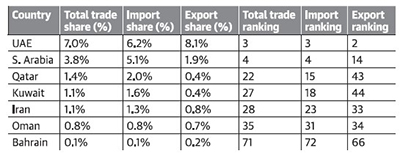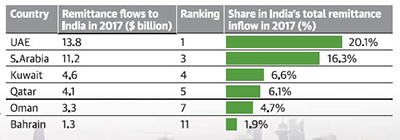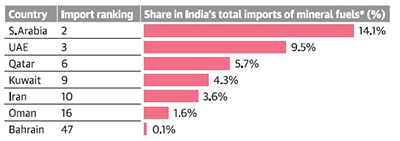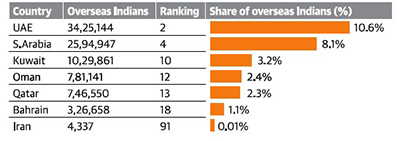Relevance: GS-2: Effect of policies and politics of developed and developing countries on India’s interests.
Key Phrases: Gulf countries, Energy needs, Trade, Remittances, NRIs, Cultivated relationships, Islamophobic, Arab nations, Merchandise exports, Foreign investment.
Why in News?
- Recent comments from two spokespersons of BJP related to Prophet Mohammad resulted into reactions from several Gulf countries with whom India has good relations.
- India’s relations with these countries have been shaped by energy needs, trade, and remittances from NRIs working there.
Context:
- There is outrage in the Arab world over derogatory comments about the Prophet made by BJP spokespersons, who have now been suspended from the party.
- Over the weekend, three Arab countries summoned India's envoy to issue a strong protest - Qatar, Kuwait and Iran. Saudi Arabia and Oman have condemned the comments of the BJP leaders very strongly as well.
- India has very good ties with all these countries. So the protest is a big setback to these carefully cultivated relationships, which are both strategically and economically important.
About the Issues
- There are two parts to this row –
- A comment that was made on national television by the BJP spokesperson Nupur Sharma, several days ago, which went viral on social media and invited a strong backlash and
- A tweet by a Delhi BJP spokesperson Naveen Kumar Jindal, which made things worse
- Both incidents together, caused a huge backlash in the Arab world.
- Qatar was the first to issue a very strongly worded statement saying that it is expecting a public apology and immediate condemnation of these remarks from the government of India, pointing out that allowing such Islamophobic remarks to continue without punishment constitutes a grave danger to the protection of human rights and may lead to further prejudice and marginalization, which will create a cycle of violence and hate.
- This was followed up with a strongly worded tweet from the assistant foreign minister of Qatar, who said that, “the Islamophobic discourse has reached dangerous levels in a country long known for its diversity and coexistence. Unless officially and systematically confronted the systematic hate speech targeting Islam in India will be considered a deliberate insult against 2 billion Muslims.”
- At least 14 countries, including Kuwait, Qatar, Iran, Iraq, Saudi Arabia, Oman, the UAE, Afghanistan, Bahrain, Maldives, Libya, Jordan, and Indonesia have lodged official protests against India, describing the comment as 'insulting'. The West Asian countries also denounced the insults of the Prophet Muhammad, and demanded an apology from the government.
- The General Secretariat of the Organisation of Islamic Cooperation (OIC) "strongly condemned" the derogatory remarks and connected them with other internal developments in India. "These abuses come in the context of the escalation of hatred and abuse of Islam in India and in the context of the systematic practices against Muslims and restrictions on them," the OIC had said in its statement.
Do you know?
Gulf countries
- Barring the Jewish state of Israel, the 10 other countries of the Gulf region - Saudi Arabia, Qatar, Iran, Iraq, Bahrain, Kuwait, United Arab Emirates, Oman, Jordan and Yemen - together account for one-fifth of the world's Muslim population, and are among the strongest voices of the Muslim world.
Gulf Cooperation Council (GCC)
- The GCC was formed in 1981 after an agreement amongst the member countries i.e. Saudi Arabia, Bahrain, Oman, Kuwait, Qatar and the United Arab Emirates (UAE).
- It is an economic and political union comprising of all the Arab countries of the Persian Gulf except Iraq.
- Although its current official name is Cooperation Council for the Arab States of the Gulf, it is still popularly and unofficially known as the Gulf Cooperation Council, its former official name.
- The grouping was formed in view of the similar political establishments in the countries based on Islamic principles, their geographical proximity, joint destiny and common objectives.

Steps by India to resolve the issues
- India has maintained good ties with Arab nations, and Prime Minister Modi in particular has prioritized India's relationship with these countries. From Saudi Arabia to the UAE, Iran, Qatar, India has good ties with all of them. In fact, Prime Minister Modi's first international visits this year were to the UAE and Kuwait in January.
- Ruling BJP suspended its national spokesperson Nupur Sharma and expelled its Delhi spokesperson Naveen Kumar Jindal, following comments they had made about Islam and the Prophet last week. The move came after three countries in the Gulf region had summoned the Indian ambassadors to their nations to register their protest, and demanded a public apology from India.
India’s response to OIC's comments
- The official spokesperson of the Ministry of External Affairs, Arindam Bagchi, said the OIC's comments are "misleading and mischievous". Further, he added that the OIC should stop its "communal approach" and said "it is regrettable that the OIC Secretariat has yet again chosen to make motivated, misleading and mischievous comments. This only exposes its divisive agenda being pursued at the behest of vested interests."
What is the Organisation of Islamic Cooperation?
- The OIC is the second largest intergovernmental organisation after the United Nations with a membership of 57 Islamic States. It is considered as the collective voice of the Muslim world.
- It endeavours to safeguard and protect the interests of the Muslim world in the spirit of promoting international peace and harmony among various people of the world.
- The Organisation of the Islamic Conference was established by the First Islamic Summit Conference held in Morocco in September 1969, to marshal the Islamic world after an act of arson at the Al-Aqsa Mosque in Jersualem by a 28-year-old Australian in 1969.
- Headquarters: Jeddah, Saudi Arabia.
Why is the Gulf Region Crucial for India?
- India shares good relations with most of the countries in the Gulf.
- The two most important reasons for the relationship are
- oil and gas and
- trade
- Two additional reasons are the huge number of Indians who work in the Gulf countries, and the remittance they send back home.
- The Gulf nations like Saudi Arabia and Qatar have a good relationship with India.
- New Delhi imports crude oil and natural gas from these countries and exports pearls, precious and semi-precious stones; metals; imitation jewellery; electrical machinery; iron and steel; and chemicals to these countries.
- In 2020-21, India imported goods worth USD 110.73 billion from the six GCC (Gulf Cooperation Council) nations. Its merchandise exports stood at USD 44 billion to these nations.
- The UAE was India’s third largest trading partner in 2021-2022, and second largest for both exports (USD 28 billion) and imports (USD 45 billion) when these are counted individually.
- At a total volume of USD 42.9 billion in 2021-22, Saudi Arabia was India’s fourth largest trading partner.
- It was India’s fifth largest trading partner in 2021-22 at USD 34.3 billion.
- Qatar accounts for 41% of India’s total natural gas imports.
- Major Indian financial institutions have a presence in Oman. Indian companies have invested in Oman in sectors like iron and steel, cement, fertilisers, textile etc.
- Gulf nations have a large number of the Indian population. Out of about 32 million non-resident Indians (NRIs), nearly half are estimated to be working in Gulf countries. These NRIs send a significant amount of money back home.

- According to a November 2021 report of the World Bank, India got USD 87 billion in foreign remittances in 2021. Of this, a sizeable portion came from the GCC nations.

- Oil dependence: The table below lists the share of GCC countries and Iran in India's total fuel imports which includes crude oil, natural gas and coal between 2017 and 2021. For instance, 14% of India's fuel needs were sourced from Saudi Arabia during this period.

- Indians in the Gulf: The table below shows the number of overseas Indians in GCC countries and Iran according to the latest data published by the Ministry of External Affairs. About 3.4 million Indians reside in the UAE alone.

Other Recent Developments
- Recently, India and Oman signed a Programme of Cooperation (POC)
in the fields of Science and Technology for the period 2022 – 2025.
- The POC for Cooperation in the fields of Science and Technology was signed in pursuance of the Agreement for Cooperation in Science and Technology(S&T) concluded on 5th October, 1996 between Oman and India.
- In September 2021, India and the UAE formally launched negotiations on the India-UAE Comprehensive Economic Partnership Agreement (CEPA).
- In 2021, the Indian External Affairs Minister met the Foreign Minister of the Kingdom of Saudi Arabia, where both countries discussed bilateral cooperation in multilateral forums such as the United Nations, G-20 and Gulf Cooperation Council (GCC).
- In 2021, India and Bahrain agreed to strengthen their historic ties, including in areas of defence and maritime security.
- In 2020, the legal and legislative committee of Kuwait’s National Assembly approved the draft expat (expatriate) quota bill.
- According to the bill, Indians should not exceed 15% of the population and if it is enacted into law, over 8 lakh Indians could be forced out of Kuwait.
Conclusion:
- Experts believe that the present diplomatic row over derogatory comments won't impact India's relationship with the Arab countries.
- The reactions from West Asian countries were expected as derogatory comments about someone or religious leaders are bound to have such impact. At the same time, they understand the Indian government has nothing to do with the remarks and it was done by certain individuals.
- It is natural that they hold the ruling party accountable at the end of the day. Hence, ambassadors were called and they have clarified the things satisfactorily.
Source: Indian Express
Mains Question:
Q. Discuss the economic interdependence between gulf countries and India.








